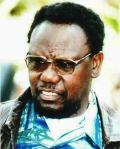The Independent Newsweekly
| National
Catholic Reporter
The Independent Newsweekly |
| Global Perspective |
| September 28, 2004 |
Vol. 2, No. 21
|

Joseph Adero Ngala is an African journalist based in Kenya. In 1995 he won the German Shalom Prize for reporting in Rwanda and Sudan. Annan said the United Nations cannot solve the problem "without requiring that one or both of the parties do something that they would not voluntarily agree to do." It is an old stalemate, but a new element has been introduced: the prospects of oil and gas. |
Saharawi: Africa's last colonyBy Joseph Adero Ngala ADDIS ABABA, Ethiopia -- When Africa's heads of state met here for the Africa Union summit this summer, media attention focused on the crisis in Darfur. Walking the corridors of the summit was a man who drew little attention, Mohammed Abdelaziz, President of the Saharawi Democratic Republic, Africa's last colony. The colonizer is Morocco, although Moroccan King Mohammed VI spews royal fury on hearing that charge.
Western Sahara is largely hills, stones and sandy plains. Sometimes it gets so hot flies seek shade lest their wings are burnt. When the heavens are kind, rain falls and vegetation sprouts in wadis. Some grains, such as wheat, can be grown. Most Saharawis are black, but they are Muslims and speak classic Arabic. The country's neighbors are Mauritania, Algeria and Morocco. On its west is l,ll0 kilometers of Atlantic Ocean coastline. It is not the land but the offshore that is enticing money people from as far as Australia and the Unites States. They say natural gas and oil deposits there are worth more than another look. Other than colonial gluttony, it is unclear why Spain colonized Western Sahara in l884. When African colonies were clamoring for independence, the Saharawis didn't murmor. Then in l963, someone discovered phosphate deposits, the raw material for fertilizer. Voila! Morocco and Mauritania unearthed claims to the territory. Mauritanian's claim was outright silly, but Morocco's were based on allegiance some Saharawi chieftains purportedly had to past Morocco kings. It was like the sultan of Zanzibar claiming Tabora on hearing Tanganyika (Tanzania) would become independent. The International Court of Justice saw the matter differently and in l975 ruled the Sharawis were entitled to determining their future. Morocco responded by sending 350,000 civilians into Western Sahara. Spain cowardly left the territory to Mauritania and Morocco in 1976. With more than nudges from Algeria, Morocco's bitter rival, Mr. Abdelaziz and his poplar Front for the Liberation of Saguia Hamra and Rio de Oro, or Polisario, took up arms. Three-way fighting insued until Mauritania threw in the towel in 1979. Then Morocco gobbled up almost the entire country. In a diplomatic blunder, Mr. Abdelaziz proclaimed a republic. The Organization of Africa Unity was gung-ho on liberation movements. Had Polisario remained a liberation movement, it would have gotten solid legitimacy. Another diplomatic stupidity followed. The OAU admitted Saharawi, which as a republic was legally nonexistent, as a member. The result has been intransigence.
Morocco is opposed to the participation of Saharawi refugees. There are an estimated one million Saharawis. More than l60,000 are in Algerian camps, tens of thousands more are in Morocco and scattered elsewhere, and more are internally displaced in Western Sahara. Last year Mr. James Baker, a former U.S. secretary of state, was appointed U.N. special envoy to Western Sahara. He proposed that the territory have self-rule for four to five years. Then its long-term residents and the refugees would vote in a referendum on three options: continued autonomy, integration with Morocco or independence. Mr. Abdelaziz said fine. King Mohammed yawned. Mr. Baker quit. In April, Mr. Annan got the Security Council to renew for a year the mandate of the United Nations Mission for the Referendum in Western Sahara. For l3 years, the United Nations has poured $600 million into Western Sahara. It has only refugees to show for it. Some U.N. programs are novel but dubious. They include setting up telephone links for refugees in Algeria to talk to relatives in Western Sahara. The United Nations also flies refugees into Western Sahara (and then out) for visits with family, presumably including conjugal visits for people who haven't see each other for more than two decades. Annan said the United Nations cannot solve the problem "without requiring that one or both of the parties do something that they would not voluntarily agree to do." It is an old stalemate, but a new element has been introduced: the prospects of oil and gas. King Mohammed has granted natural gas and oil prospecting concessions. Mr. Abdelaziz is doing the same. Oil fuels passions these days. The king has military power to fight for his stake. The Saharawis can resort to more than sabotage. Tutorials from Osma bin Laden abound. Real trouble is simmering. |
||||||||
| Copyright
© 2004 The National Catholic Reporter Publishing Company, 115
E. Armour Blvd., Kansas City, MO 64111
TEL: 1-816-531-0538 FAX: 1-816-968-2280 |